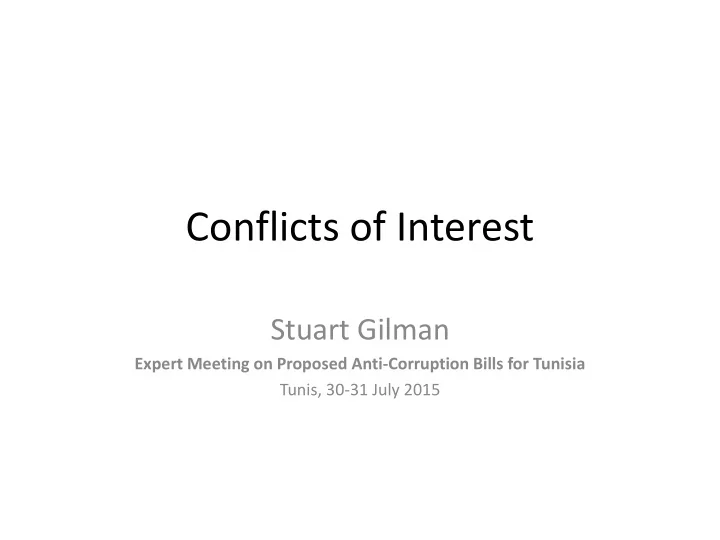

Conflicts of Interest Stuart Gilman Expert Meeting on Proposed Anti-Corruption Bills for Tunisia Tunis, 30-31 July 2015
New Zealand • We must be fair, impartial, responsible, and trustworthy • The State Services is made up of many organisations with powers to carry out the work of New Zealand's democratically elected governments. • Whether we work in a department or in a Crown entity, we must act with a spirit of service to the community and meet the same high standards of integrity and conduct in everything we do. • We must comply with the standards of integrity and conduct set out in this code. As part of complying with this code, our organisations must maintain policies and procedures that are consistent with it. • URL: http://www.ssc.govt.nz/node/2068
Georgia • “ Conflicts of interests in public services” is the conflict between private or property interests of a public official with the interests of public service. • An official has no right to disclose or use for any other purposes information containing an official secret or any other type of confidential information which has become known to him/her during conducting his/her official duties • An official who is obliged to serve or make decisions free of charge under the public service has no right to receive or require the compensation or any other type of benefit for such a service. • 2. An official who for the public service is obliged to render a service or make a decision for consideration in the officially fixed amount is prohibited to receive or require more that the stipulated amount. • 3. An official has no right to get any compensation from information created or searched by the State Treasury Organ as well as for publication of work, report or any other material made on grounds of such information. An official has no right to make a property deal with the Treasury Establishment where s/he holds position.
France • Article 2 • For the purposes of this Act, a conflict of interest is any interfering interest, public or of public or private interest, which would influence or appear to influence the exercise independent, impartial and objective function. • When they feel to be in such a situation: • 1. The members of an independent administrative authority or a independent public authority abstain from participating. People who exercise their own powers within those authorities are obligated to follow the operating rules applicable to those authorities; • 2. The persons holding local executive functions are delegated by their citizens which they refrain from giving instructions; • 3. The persons charged with a public service mission that received delegation of signature refrain from using it; • 4. The persons responsible for a public service mission under the authority of a superior the hierarchical grasp; the latter, as a result of the referral or on its own initiative, shall, where appropriate, the preparation or production of the decision to another person under his authority. (recusal)
US Conflict of Interest Statutes • Government employees cannot represent anyone other than themselves on any matter before the executive branch or any court, if the country has an interest (including pro bono). • Revolving Door – Representational ban on coming back to the government on any matter under your official supervision or responsibility. • prohibits an executive branch employee from participating personally and substantially in a particular Government matter that will affect his own financial interests, as well as the financial interests of: spouse or minor child, general partner, organization in which he serves as an officer, director, trustee, general partner or employee, and a person with whom he is negotiating for or has an arrangement concerning prospective employment. • employees cannot be paid by someone other than the government for doing their official Government duties.
US Standards of Conduct (Civil) • Gifts from outside sources. • Gifts between employees • Conflicts of Interest beyond spouse and minor child • Avoiding the appearance of loss of impartiality • Seeking outside employment • Misuse of position • Outside activities • Available in Arabic and French: • http://www.oge.gov/Laws-and-Regulations/Employee-Standards-of- Conduct/Employee-Standards-of-Conduct/
Canada (House of Commons) • ( a ) to serve the public interest and represent constituents to the best of their abilities; • to fulfill their public duties with honesty and uphold the highest standards so as to avoid real or apparent conflicts of interests, and maintain and enhance public confidence and trust in the integrity of each Member and in the House of Commons; • ( c ) to perform their official duties and functions and arrange their private affairs in a manner that bears the closest public scrutiny, an obligation that may not be fully discharged by simply acting within the law; • d ) to arrange their private affairs so that foreseeable real or apparent conflicts of interest may be prevented from arising, but if such a conflict does arise, to resolve it in a way that protects the public interest; and • e) not to accept any gift or benefit connected with their position that might reasonably be seen to compromise their personal judgment or integrity except in accordance with the provisions of this Code. • YRL: http://www.parl.gc.ca/About/House/StandingOrders/appa1-e.htm
Recommend
More recommend